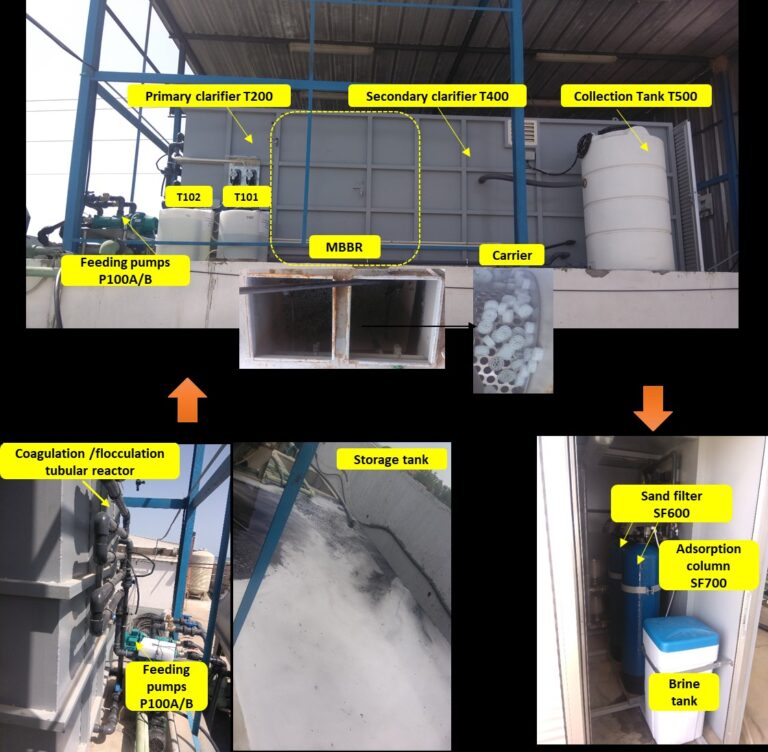Result description
A 10 m3/d pilot plant for the treatment and agricultural reuse of textile wastewater was installed at the G-Wash factory, in Nabeul, Tunisia. The challenge of MADFORWATER project was to develop a treatment train able to attain high treatment efficiency and reliability, with reduced capital, operation and maintenance costs.
The textile wastewater treatment section of the pilot plant consists of the following operations: (i) a coagulation / flocculation pre-treatment unit, (ii) a primary clarifier, (iii) an aerobic Moving Bed Biological Reactor (MBBR), (iv) a secondary clarifier, (v) a sand filter followed by dye adsorption on resins to further remove the remaining color, and (vi) a drying bed for sludge dewatering.
The quality of the treated textile wastewater will be compared with Tunisian national permission limits (NT106.03) before it will be reused as irrigation water to evaluate the growth and development of selected forage crops and to test innovative irrigation technologies.
During the start-up period, the MBBR reactor was inoculated by activated sludge and operated on batch mode. The soluble COD content decreased by 84%. The MBBR reactor was then operated in continuous mode at 4 h retention time. The influent was firstly settled in a clarifier tank with a 4.5 h retention time and the effluent passed through the 2nd clarifier with a 3.8 h retention time. Results showed COD removal efficiency of about 30%. The concentrations of orthophosphate and ammoniacal nitrogen were particularly low and largely inferior to the limits imposed by the Tunisian regulations published in 2018 (10 mg/L for ammoniacal nitrogen and total phosphorus). Suspended solids in the treated effluent varied in the range 0.4 to 1.3 g/L. The treatment train led to a progressive decolorization of the influent to up to 87%.
Addressing target audiences and expressing needs
- To raise awareness and possibly influence policy
- Help in technical expertise
- Collaboration
- Other type of Investment
The target audience is all individuals and organizations associated with operational activities at wastewater treatment plants and irrigation activities, including wastewater treatment plant directors, End-Use Market Participants of Different Segments of wastewater treatment systems, government and research organizations, environmental and public health scientists, sanitation and hygiene authorities, agricultural authorities, policy makers and those responsible for developing standards and regulations.
- Public or private funding institutions
- EU and Member State Policy-makers
- Research and Technology Organisations
- Academia/ Universities
- Private Investors
R&D, Technology and Innovation aspects
Result submitted to Horizon Results Platform by ALMA MATER STUDIORUM – UNIVERSITA DI BOLOGNA

